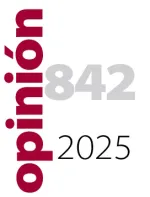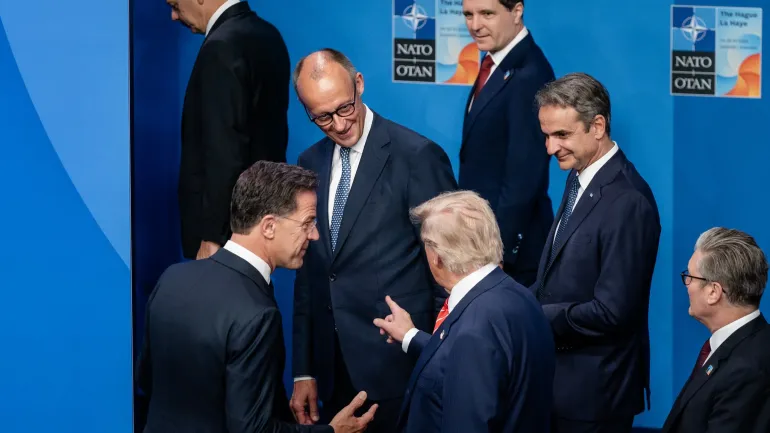Europe: less security, more dependence


The NATO summit in The Hague and the latest European Council meeting in Brussels have laid bare the growing subordination of European foreign policy. The EU’s strategic choice in the face of Donald Trump’s offensive would seem to be to act more like loyal vassals than allies of Washington. To put it another way: Europe is agreeing to be more dependent, but without obtaining more security in return.
The recent NATO summit in The Hague and European Council meeting in Brussels, together with the strikes on Iran, are another reminder of the growing subordination of European foreign policy to the dictates of the White House. Broadly speaking, the European approach appears to have been to remain passive, accompanied by the odd expression of delight at the attack on Iran, and acceptance of the magical figure of 5% of GDP on defence spending in order to avert greater harm everywhere else. Yet in return this has not secured staunch support for Ukraine, nor has there been an easing of the trade war (quite the opposite), nor has it obtained any commitment on the application of Article 5 of the NATO Treaty, which the President of the United States dispatched with an offhand “it depends”.
Meanwhile, Trump continues to support the Europhobic ultraright, to the point that the future of European defence compels us to wonder whether capitulation at The Hague was worth it.
Let’s look at it from different angles.
Iran
Europe, as far as we know, was neither informed nor consulted about the US strikes on Iran, launched in the wake of the Israeli attack with no evidence of an imminent threat in the shape of a nuclear weapon and which failed to destroy the enriched uranium stocks required to make one. At best, Iran’s nuclear programme has been set back a few months and its stockpile of ballistic missiles has been depleted.
Yet what is worse than not having been notified is that a common European position on the matter was not even debated in any depth. In the conclusions of the European Council of June 2025 there is no significant mention of the attacks on Iran, only generic reiteration of commitments to nuclear non-proliferation and regional security, without broaching the recent bombing raids or their repercussions.
And despite Europe having an important role to play, via diplomacy, to restore the international inspections and ensure the civilian use of the nuclear programme.
Making a virtue of necessity, Netanyahu and Trump’s military campaign should at least serve as an incentive for Tehran to renounce the atomic bomb, under penalty of risking an attempt at regime change.
NATO
Perhaps the most symbolic aspect of Europe’s vassalage is the submissive and uncritical acceptance of the defence spending target of 5% of GDP imposed by Donald Trump, without obtaining a reinforced guarantee of security in return.
The target is as arbitrary and unnecessary as it is unrealistic, despite being set on the distant horizon of 2035. And, moreover, it diverts attention from the important issue: meeting NATO capability targets, which is where Spain has focused its efforts.
Unquestionably the current 2% is not enough. More must be invested in our security. But 5% is excessive. Because, crucially, it is not about spending more via national rearmament plans, but about spending better; that is to say, pooling procurement in pan-European schemes and through the joint development of capabilities in a framework of continental planning for our territorial defence.
However, no few member states would rather continue to buy US materiel for political reasons, as Denmark has done with F-35 fighter jets, doubtless with the Greenland issue in mind.
In any case, a spending target of 5% of GDP, detached from the calculation of conventional capabilities and forces required to stand up to a Russian assault, makes no sense. What’s more, it may lead to squandering resources to benefit the arms industry, regardless of the deterrent effect this military effort might have on Putin. It is a dependence that also manifests itself in the inability to use certain hardware without software updates, or which requires sharing flight plans if it is to be used effectively.
A serious attempt to reach this level of spending would jeopardise the maintenance of the welfare state and the broad public support required to increase defence investment.
Most member states have chosen to submit to Trump’s blackmail in the conviction that it is the best way of preserving his in any case dubious commitment to European security, even in the knowledge that many cannot hit even 3.5% (Italy has failed to reach even 2% this year, and neither France nor the United Kingdom have the fiscal space for it).
If it is about maintaining US support for Ukraine, and easing the trade war, it does not appear to be the case. The conduct of Mark Rutte, the NATO secretary general and onetime champion of austerity during the euro crisis, calling Trump “daddy” and sending him fawning messages has been particularly toe-curling. As Carl Bildt, the former Swedish prime minister, said on social media, the transatlantic relationship is no longer built on common values and interests but on flattery.
Also, Trump and his successors have been handed the power to determine how the Europeans meet the target. This means that the United States can wash its hands of our security in either case. If we fall short of the target, for having failed to honour our commitment; and if we meet it, because US input would no longer be necessary. This means more dependence and less security.
Only Spain has told it like it is, stating that the 5% goal has no foundation and entails a disproportionate fiscal effort. At present, the EU countries as a whole invest around 1.9% of GDP in defence. Shifting to 5% would mean an additional increase of over €350bn a year. In Spain’s case, it would involve more than doubling the current defence budget to in excess of €70bn euros a year.
And all while Spain is about to meet the essential commitments. According to NATO itself, the country has reached 90% of the goal for priority capabilities and substantially increased its operational presence. Spain, what’s more, is a security provider, with participation in multiple NATO and EU missions.
The European allies should have concentrated on battling for the 3.5% target. This is more realistic looking to a horizon of a decade, more in line with the capability targets and above all with the goal of investing jointly in a European pillar of NATO that includes “strategic enablers” (satellites, communications, air-to-air refuelling, etc) that right now primarily only the Americans possess.
Ukraine
We fared just as badly on Ukraine. Only the briefest of mentions was made in The Hague, with no additional pledges of military assistance. The stock phrase about lending support “for as long as it takes” was maintained, but without specifying how and by what means, which raises the question whether such genuflection over the 5% commitment was worth it for such little reward.
But it does not stop there: immediately after the summit, the United States paused some arms shipments to Ukraine and lifted sanctions on several Russian banks. Trump later reversed the first measure, but it is clear that unpredictability reigns and that his policy on Ukraine does not depend on European efforts regarding defence spending.
European Council: nothing on European defence and indecision on trade
In Brussels, the European Council meeting was yet another missed opportunity. Not a word about building a common European defence, if only on the foundation of a coalition of the willing, or about its political, strategic or institutional implications.
It would have been the logical response to mounting US scepticism over its commitment to European security. Once again, however, ambition and unity are lacking. We would rather not upset Washington, or cling to a blind faith that it would come to our aid after all, if necessary, despite Trump’s repeated threats and ambiguities on the obligation of mutual assistance in the event of aggression. In fact, Europe is afraid of being genuinely independent.
And to cap it all during the European Council meeting many member states were open to negotiating a quick – and bad – trade deal with the United States, in the style of the United Kingdom, settling for tariffs of 10% and perhaps limiting or altering our legal framework that Washington deems harmful to its companies. Yet shortly after Trump again threatened Europe with levying tariffs of 30% starting in August.
Was this NATO summit necessary only to end up accepting this as a lesser evil too? Rather, it is further proof that we do not aspire to lead the free world but to survive in the world that Trump dictates. The White House incumbent only respects strength, which means the EU must strive to take a firm line while building strategic autonomy.
It is not a question of severing an increasingly transactional transatlantic relationship, but it is a matter of at least trying to balance it out. And that can only happen when Europe commands respect and ceases to beg for benevolence on the other side of the ocean.
Keywords: EU, security, dependency, United States, NATO, 5%, strategic autonomy, Trump, Iran, Ukraine, Spain, capabilities
All the publications express the opinions of their individual authors and do not necessarily reflect the views of CIDOB or its donors
Image: © Ministerie van Buitenlandse Zaken / Bart Maat